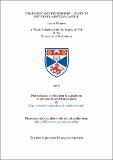Files in this item
'Oradores' and 'defensores' : death in fifteenth-century Castile
Item metadata
| dc.contributor.advisor | Haywood, Louise M. | |
| dc.contributor.advisor | Dennis, Nigel | |
| dc.contributor.author | Vivanco, Laura | |
| dc.coverage.spatial | 255 p. | en_US |
| dc.date.accessioned | 2018-06-08T12:12:40Z | |
| dc.date.available | 2018-06-08T12:12:40Z | |
| dc.date.issued | 2001 | |
| dc.identifier.uri | https://hdl.handle.net/10023/13846 | |
| dc.description.abstract | In this thesis I have sought to investigate the attitudes towards death held by the elite of Castilian secular and ecclesiastical society in fifteenth-century Castile, the defensores and oradores. Although many wide-ranging studies of death in the Middle Ages exist, previous studies of death in this region and period have tended to be limited in scope and used a relatively narrow source-base. Possible differences in ideology between defensores and oradores have largely been ignored and these two estates have tended to be grouped together, inasmuch as they are thought to have formed an elite of society, and contrasted with the mass of the population, the labradores. Using a variety of literary, historical and legal texts I have examined the way in which types of death were classified, their expected consequences in the afterlife and the responses of the bereaved. I have sought to demonstrate that oradores and defensores had two distinct and coherent ideologies which manifested themselves in their approaches to death. | en_US |
| dc.language.iso | en | en_US |
| dc.publisher | University of St Andrews | |
| dc.subject.lcc | DP136.V5 | |
| dc.title | 'Oradores' and 'defensores' : death in fifteenth-century Castile | en_US |
| dc.type | Thesis | en_US |
| dc.type.qualificationlevel | Doctoral | en_US |
| dc.type.qualificationname | PhD Doctor of Philosophy | en_US |
| dc.publisher.institution | The University of St Andrews | en_US |
This item appears in the following Collection(s)
Items in the St Andrews Research Repository are protected by copyright, with all rights reserved, unless otherwise indicated.

